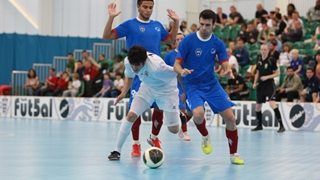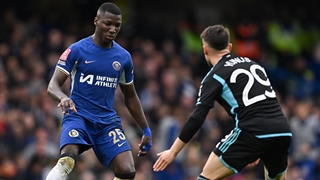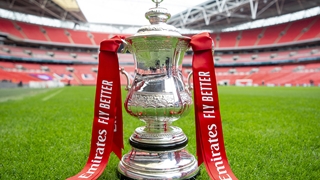
FIFA Futsal Laws of the Game
Fouls and misconduct are infringements of the Futsal Laws of the Game that are penalised as follows:
Fouls
Fouls are penalised with a direct free kick, penalty kick or indirect free kick.
Fouls penalised with a direct free kick
A direct free kick is awarded to the opposing team if a player commits any of the following seven offences in a manner considered by the referees to be careless, reckless or using excessive force:
- kicks or attempts to kick an opponent
- trips an opponent
- jumps at an opponent
- charges an opponent
- strikes or attempts to strike an opponent
- pushes an opponent
- tackles an opponent
A direct free kick is also awarded to the opposing team if a player commits any of the following three offences:
- holds an opponent
- spits at an opponent
- handles the ball deliberately (except for the goalkeeper within his own penalty area) A direct free kick is taken from the place where the offence occurred (see Law 13 - Position of free kick). The above offences are accumulated fouls.
Fouls penalised with a penalty kick
A penalty kick is awarded if any of the above ten offences is committed by a player inside his own penalty area, irrespective of the position of the ball, provided it is in play.
Fouls penalised with an indirect free kick
An indirect free kick is awarded to the opposing team if a goalkeeper commits any of the following four offences:
- controls the ball with his hands or feet in his own half of the pitch for more than four seconds
- after playing the ball, he touches it again in his own half of the pitch after it has been deliberately kicked to him by a team-mate without an opponent playing or touching it
- touches the ball with his hands inside his own penalty area after it has been deliberately kicked to him by a team-mate
- touches the ball with his hands inside his own penalty area after he has received it directly from a kick-in by a team-mate
An indirect free kick is also awarded to the opposing team if, in the opinion of the referees, a player:
- plays in a dangerous manner in the presence of an opponent
- impedes the progress of an opponent
- prevents the goalkeeper from releasing the ball from his hands
- commits against a team-mate one of the nine offences penalised with a direct free kick if they are committed against an opponent
- commits any other infringement not previously mentioned in Law 12 or in any other Law, for which play is stopped to caution or dismiss a player
The indirect free kick is taken from the place where the offence occurred (see Law 13 - Position of free kick).
Misconduct
Misconduct is penalised with a caution or a sending-off.
Disciplinary sanctions
The yellow card is used to communicate that a player or substitute has been cautioned. The red card is used to communicate that a player or substitute has been sent off.
Only a player or substitute may be shown the red or yellow card. The relevant card is shown publicly and only on the pitch once the match has started.
In other cases, the referees verbally inform the players and team officials of the disciplinary sanction taken.
The referees have the authority to take disciplinary sanctions from the moment they enter the premises where the pitch is located before the start of the match until they leave them.
A player who commits a cautionable or sending-off offence, either on or off the pitch, whether directed towards an opponent, a team-mate, the referees or any other person, is disciplined according to the nature of the offence committed.
Cautionable offences
A player is cautioned if he commits any of the following seven offences:
- unsporting behaviour
- dissent by word or action
- persistent infringement of the Futsal Laws of the Game
- delaying the restart of play
- failure to respect the required distance when play is restarted with a corner kick, free kick or kick-in (defending players)
- entering or re-entering the pitch without the referees' permission or infringement of the substitution procedure
- deliberately leaving the pitch without the referees' permission
A substitute is cautioned if he commits any of the following four infringements:
- unsporting behaviour
- dissent by word or action
- delaying the restart of play
- entering the pitch by infringing the substitution procedure
Sending-off offences
A player or substitute is sent off if he commits any of the following seven offences:
- serious foul play
- violent conduct
- spitting at an opponent or any other person
- denying the opposing team a goal or an obvious goalscoring opportunity by deliberately handling the ball (this does not apply to a goalkeeper within his own penalty area)
- denying an obvious goalscoring opportunity to an opponent moving towards the player's goal by an offence punishable by a free kick or a penalty kick
- using offensive, insulting or abusive language and/or gestures
- receiving a second caution in the same match
A substitute is sent off if he commits the following offence:
- denying a goal or an obvious goalscoring opportunity
A player or substitute who has been sent off must leave the vicinity of the pitch and the technical area.





